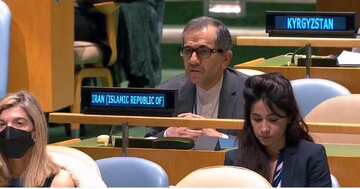"The sanctions imposed by the UN Security Council on specific individuals and entities in Afghanistan must not impede humanitarian, economic, or developmental cooperation with Afghanistan," Takht Ravanchi said on Thursday addressing the United Nations Security Council meeting on 'Situation in Afghanistan'.
The following is the full text of Takht Ravanchi's speech at the UNSC:
Mr. President,
I would like to begin by expressing our heartfelt condolences to the people of Afghanistan and families of victims of the recent earthquake in Khost, Afghanistan. We stand with the people of Afghanistan at this difficult time and have already dispatched two airplane shipments of humanitarian aid to the earthquake-affected areas.
Mr. President,
I thank the briefers for their briefings.
We take note of the Secretary-General's recent report on the situation in Afghanistan.
According to the report, in early 2022, humanitarian needs continued to rise, with 24.4 million people, or 59 percent of the population were in need of assistance, up from 18.4 million at the start of 2021.
As a neighbor to Afghanistan, Iran has used its capacities and resources to help the people of Afghanistan overcome the challenges they have faced. We have been hosting millions of refugees who have unfortunately received minimal international assistance in the last 40 years. The latest example of our assistance to Afghan refugees has been the extensive vaccination against Covid-19 of Afghans living in Iran. Neighbors of Afghanistan, including Iran, should not feel all the burdens associated with receiving Afghan refugees. Other countries should welcome the refugees as well.
We support the United Nations' efforts to meet Afghanistan's expanding humanitarian needs including the system-wide Transitional Engagement Framework to provide basic human needs.
We emphasize the importance of the international community's continued engagement with Afghanistan, particularly in supporting the people's humanitarian and development needs, and we urge the international community, particularly donor countries, to continue to provide all possible and necessary assistance to the Afghan people. For our part, in the course of last months, Iran has provided more than 30 consignments of humanitarian assistance to the people of Afghanistan.
As we have repeatedly stated, Afghanistan's frozen assets belong to the Afghan people, and their release, which is crucial for helping the Afghan economy and saving lives, should not be politicized or conditional in any way. We highlight the need for taking relevant actions, such as reopening channels of financial and in-kind support and resources to the Afghan people, as well as exploring real alternatives for unfreezing Afghanistan's financial assets and improving access to lawful banking services. Similarly, sanctions imposed by the UN Security Council on specific individuals and entities in Afghanistan must not impede humanitarian, economic, or developmental cooperation with Afghanistan.
Mr. President,
Attacks claimed or attributed to Daesh or its affiliated groups have recently increased and spread in Afghanistan. We are deeply concerned about such terrorist activities. This trend underlines the international community's continued demand that Taliban must commit to fighting terrorism and ensure that Afghanistan is no longer a safe haven for terrorist groups like Daesh and Al-Qaida that have been responsible for heinous acts of terror, not only in Afghanistan, but throughout the region and beyond.
Equally critical, efforts to combat drugs trafficking must be a priority. Every year, Iran is directly affected by this menace and pays a high price for it. We welcome Taliban's decision to outlaw all drugs. However, given the fact that Taliban has not taken the necessary precautionary measures to confront this year's harvest, as well as the unavailability of information on the seizure of drugs and arrest of drug traffickers, concerns about the impact of the illegal drug trade remain strong.
Mr. President,
The absolute need for the formation of an inclusive government in Afghanistan, representing the country’s multi-ethnic society, is crystal clear. The people of Afghanistan from different religious and ethnic backgrounds, especially the younger generation who will lead Afghanistan in the future, must be assured that they have a say in the affairs of their country. This would not be possible unless an inclusive government is established and sufficient attention is paid to Afghanistan’s political and social structures that can involve people from all walks of life including ethnicities, men, women, and youth.
Despite repeated international calls, however, Taliban has failed to make significant efforts to ensure the government's true ethnic and political inclusiveness. Formation of an inclusive government in Afghanistan is a prerequisite and a critical component for the international recognition.
The SG’s report indicates that many of Taliban’s decisions have weakened fundamental human rights, particularly those of women and girls. Taliban should protect all human rights, particularly the rights of women and minorities as well as the right to education.
We continue to consult with Afghanistan's neighbors, as well as regional and international partners, including the United Nations, in order to assist Afghanistan in achieving long-term peace, security, and stability.
Finally, we support UNAMA's efforts to promote peace and stability in Afghanistan in accordance with its mandate.
I thank you.


Your Comment